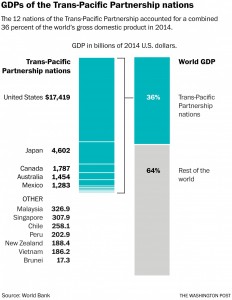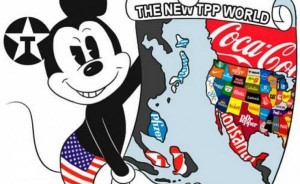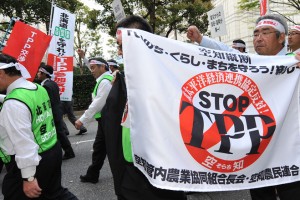The Trans-Pacific Partnership Negotiations Are Finished: Here’s What You Need to Know
by James CorbettTheInternationalForecaster.com
October 6, 2015
Last-minute negotiations over the Trans-Pacific Partnership (TPP) deal in Atlanta this past week finally ended on Monday when trade ministers emerged with a deal. It’s a testament to the secrecy and apathy that has surrounded the entire TPP process that most people didn’t even know these negotiations were taking place, let alone that a deal was near. Nevertheless, the completed deal is now on its way to member countries for ratification.
So what is the deal? Who is behind it? Why are so many opposed to it? And what’s next? Here’s a primer on what you need to know as the TPP deal enters the home stretch.
What is it?
 The
TPP is a so-called “free trade agreement” that is the largest such deal
since NAFTA. If ratified it will cover 12 countries, impacting over 400
million people and nearly 40% of the world’s GDP. Member nations of the
TPP negotiations include Australia, Brunei, Canada, Chile, Japan,
Malaysia, Mexico, New Zealand, Peru, Singapore, the United States and
Vietnam.
The
TPP is a so-called “free trade agreement” that is the largest such deal
since NAFTA. If ratified it will cover 12 countries, impacting over 400
million people and nearly 40% of the world’s GDP. Member nations of the
TPP negotiations include Australia, Brunei, Canada, Chile, Japan,
Malaysia, Mexico, New Zealand, Peru, Singapore, the United States and
Vietnam.What does it do?
We do know that the TPP agreement is a 30 chapter document dealing with everything from agricultural tariffs to intellectual property to wildlife conservation to customs and financial services. It will impact the auto industry, dairy farmers, pharmaceutical companies (and their patients), even people who share files online. In short, it is a comprehensive agreement.
We do not know what the text actually says. We have a rough idea based on leaked drafts of previous negotiating texts and the pronouncements of various officials privy to the talks and the ridiculously vague summaries of the US Trade Representative and other official bodies, but the text itself has yet to be released for public consumption.
This is a reflection of the unprecedented secrecy that has shrouded these negotiations, including restricting members of US Congress’ access to the negotiating text to classified briefings and basement readings and paramilitary security with helicopter surveillance patrolling TPP summits for would-be protesters.
Who wins?
 In
a word: business. No, not mom and pop corner store business, big
multinational corporate business. But you probably could have guessed as
much already. After all, there’s a reason the US Business Coalition for
TPP existed, let alone spent over $1.1 million buying off Congressmen ahead of the “Fast Track” trade authority vote earlier this year.
In
a word: business. No, not mom and pop corner store business, big
multinational corporate business. But you probably could have guessed as
much already. After all, there’s a reason the US Business Coalition for
TPP existed, let alone spent over $1.1 million buying off Congressmen ahead of the “Fast Track” trade authority vote earlier this year.Hollywood and the MPAA can celebrate more stringent international enforcement of their “intellectual property” to bolster their failing business model. Big Pharma likewise will benefit from more stringent enforcement of their patents to prevent smaller countries from selling generic copies of their signature drugs. American dairy farmers are winners, gaining greater access to Canadian markets. American manufacturers will win as relaxed rules make it even easier to ship jobs to developing Asian countries. Vietnamese manufacturers benefit from that outsourcing even as they dodge the “labor organization” bullet.
In every case, the clear common denominator is that big business is going to win big time if the deal gets through.
Who loses?
 Pretty
much everyone else. That’s why you’ll see an extraordinary range of
people opposed to this deal, from the mainstream left (Hillary Clinton) and the mainstream right (Mike Huckabee) to the controlled “alternative” left (Noam Chomsky) and the controlled “alternative” right (The New American) to libertarians and environmental groups and trade unions
and basically everyone who isn’t in favor of crony capitalism. Only a
truly bad deal could bring together such a disparate bunch. And this
deal is bad.
Pretty
much everyone else. That’s why you’ll see an extraordinary range of
people opposed to this deal, from the mainstream left (Hillary Clinton) and the mainstream right (Mike Huckabee) to the controlled “alternative” left (Noam Chomsky) and the controlled “alternative” right (The New American) to libertarians and environmental groups and trade unions
and basically everyone who isn’t in favor of crony capitalism. Only a
truly bad deal could bring together such a disparate bunch. And this
deal is bad.Vaguely worded agreements to standardize the protection of “trade secrets” threaten to undermine whistleblowers and journalists who are trying to expose corruption and counter needless secrecy.
A “three-step test” for approving member nations’ copyright limitations legislation threatens to make much of the open source / fair use reporting done by The Corbett Report and others illegal, or legally onerous to perform.
It threatens to introduce criminal sanctions on file sharers who are deemed to share on a vaguely defined “commercial scale” (perhaps including posting a link to a YouTube video on a blog).
Doctors Without Borders has been uncharacteristically vocal on this political issue, unequivocally stating that the TPP deal is “a bad deal for medicine.” (Some theorize this position earned them an unwelcome visit from the US military in Afghanistan.)
The list goes on and on, but one thing is certain: wage laborers, small businesses and others ‘too small to succeed’ can all find something to hate in this agreement.
What’s next?
In the US, Obama will not be able to sign the deal for 90 days, and it will be a month or more after that before the legislation to implement the deal is introduced in the house. This means the process will take months to complete, and likely come to a head in the heat of the 2016 sElection cycle.
And that’s just the US. Canada is likewise heading into an election this month and one of the main opposition parties has already stated that they will not feel bound by the deal. The Abe government in Japan, already reeling from public protest over recently passed “security” legislation to remilitarize the country, is facing a huge backlash from its farm lobby over the opening up of long-protected Japanese agricultural produce markets.
If there is any good news on the horizon, it’s that the deal’s ratification is still up in the air, with many being pessimistic of its chances in this politically volatile climate. But then, they said that about the negotiations themselves and look where that got us.
In the meantime, concerned men and women across the Pacific Rim collectively hold their breath for the full text in order to assess the potential damage.



No comments:
Post a Comment